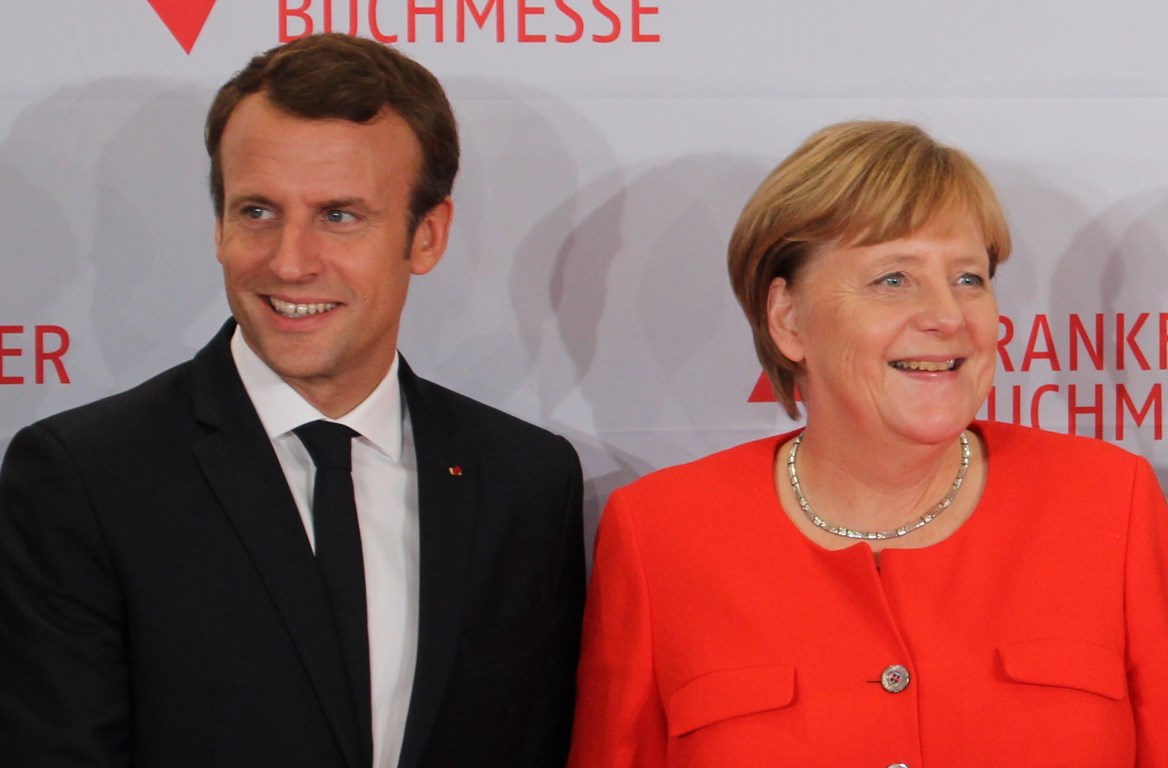Macron and Merkel spar over EU leadership
June 4, 2019 | Expert Insights

Background
The European Union (EU) is a political and economic union of 28 European states. It primarily institutes a single internal market through a standardised system of regulations that apply to all member states. It also enacts legislation relating to home affairs and the judiciary, in addition to developing standard policies on regional development.
The European Parliament (EP) is one of three legislative institutions of the EU. Along with the Council of the European Union, composed of the leaders of member countries, the EP amends and approves proposals by the European Commission. The European Commission (EC) is the EU’s executive and the only institution that can propose legislation, including the EU budget. The EC operates as a cabinet government, with 28 representatives from each member state. The European Council recommends one of the 28 as the Commission President before being elected by the European Parliament.
Recent parliamentary elections saw centrist blocs that have dominated the EP, lose ground to the Greens and nationalist parties. The Commission President is typically chosen from the largest party in the EP, with the current president, Jean-Claude Juncker, coming from the centre-right European People’s Party (EPP). The EPP won 217 seats in 2014, compared to 180 in 2019 out of the 751-seat parliament, although it still is the largest party. The second largest party is the Socialists and Democrats (S&D) with 146 seats.
Analysis
France and Germany have disagreed as to who should take on the role of the EC President. German Chancellor Angela Merkel said that she wanted centre-right candidate Manfred Weber for the job. French President Emmanuel Macron has proposed either Denmark’s Margrethe Vestager or France’s Michel Barnier for the top job.
As a member of the EPP, Manfred Weber’s candidacy is based on the party’s position as the largest bloc in the European Parliament. French President Macron told reporters that his choice for the post would be someone “who has experience either in their country or in Europe that allows them to have credibility and savoir-faire.” Analysts believe this to be a statement against Mr Weber, who has never served in government or an institution like the EC. Margrethe Vestager, on the other hand, currently serves as the commissioner responsible for competition issues, leading anti-trust campaigns against large companies. Michel Barnier also has more experience than Mr Weber, having led the EU’s negotiations on Brexit with the UK.
Chancellor Merkel’s support of Mr Weber stems from her long-standing partnership with the EPP. Mr Weber has led the EPP since 2014.
The Council of the European Union, comprising the leader of each member states, is in charge of nominating critical positions within the EU’s architecture. The Council defines the bloc's overall political direction and its priorities. EU leaders are expected to discuss other top jobs such as who will replace Donald Tusk as European Council president. This position chairs meetings of the Council. Also under discussion is who will become the bloc’s next high representative - the position serves as the groupings foreign minister - and who will become the head of the European Central Bank.
With recent parliamentary elections weakening the hold of centrist blocs that have dominated the EP since the Second World War, it is unclear whether a working majority can be secured. This issue is unlikely to be resolved until the lawmakers in the European Parliament gather in July 2019. The European Parliament’s role in confirming the nomination of those selected by the Council through a vote is a critical factor in who is chosen for Europe’s top jobs.
European leaders, who compose the Council, seek to find a solution as early as possible so that when the EP meets in July, a proposal would be ready. However, early signs suggest that finding consensus is likely to be time-consuming. Analysts believe that a power struggle is imminent between the Council and the Parliament. Party group leaders of the Parliament have insisted that those chosen must be from among the candidates they suggest. This is at odds with the position of some nations government leaders like Mr Macron, who insists that state leaders should decide who will secure these positions.
Assessment
Our assessment is that France and Germany represent two perspectives as to how Europe’s top jobs must be filled; President Macron believes European state leaders must decide who gets the job, while Chancellor Merkel is willing to allow European Parliament to determine the outcome. Chancellor Merkel’s party, the EPP, is likely to fill top posts if the European Parliament is to decide, although it is still unclear as to how a working majority will be secured. We believe President Macron’s pro-Europe, pro-business position compels him to stand against inroads made by the Greens and nationalists in the European Parliament. Mr Macron fears that these groups stand in opposition to his stance on a united Europe. We feel that the issue will only be cleared towards the end of June 2019, when Europe’s leaders are likely to unite on candidates before the EP convenes in July 2019.
Read More:
Image Courtesy - ActuaLitté [CC BY-SA 2.0 (https://creativecommons.org/licenses/by-sa/2.0)]








Comments